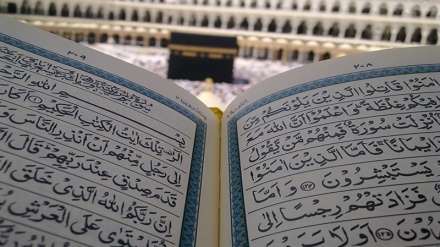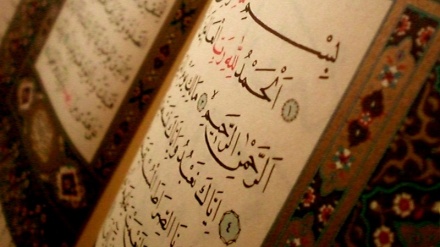Path towards Enlightenment (1045)
Welcome to our latest episode of “Path towards Enlightenment”, which is an endeavour to make you and us familiar with an easy and fluent explanation of God’s Final Scripture to all mankind, the holy Qur’an that was revealed to the Last and Greatest of all Messengers, Prophet Mohammad (blessings of God upon him and his progeny).
Last week we completed explanation of “Surah Jinn” and today we take up the next Surah, that is, “Surah Muzzammil” – the number 73 in the serial order of compilation of the holy Qur’an.
It was revealed in Mecca and has 20 Ayahs. The Surah revealed in the early days of the Prophet’s universal mission of Islam, opens by addressing him as “Muzzammil” or the “Enwrapped” in a cloak or sheet. This epithet means the one renouncing the vanities of the world, or separating himself from all trifle matters for the purpose of meditation, which indicates the Prophet's preparedness to receive the Divine commandments to guide mankind. The Surah describes how God relaxed the early regime of devotion first decreed to the Prophet and prepared him for the weighty message of Divine Revelation. The Prophet is urged to be patient against the enemies and is informed in Ayah 10 of the punishment that awaits the disbelievers in Hell. Ayah 15 refers to the punishment that befell Egyptian tyrant, the Pharaoh, while alive, thereby drowning him in the sea.
According to a hadith from the Prophet, whoever regularly recites Surah Muzzammil, will not face hardships in this world and in the Hereafter.
We invite you to listen to Ayahs 1, 2, 3, 4, and 5:
"In the Name of Allah the All-Compassionate the All-Merciful – O you wrapped up in your mantle!
“Rise (to observe vigil) through the night, except a little,
“A half, or reduce a little from that
“Or add to it, and recite the Qur'an in a measured tone.
“Indeed, soon We shall bestow on you a weighty word."
The Almighty Creator affectionately addresses His Best of creation with words which mean “O you who are wrapped in your mantle”, that is, O’ you who is girded to undertake that which has been entrusted to you. So, rise up at night for prayer, especially the post-midnight prayer, and for contemplation at a time when people are normally asleep after their daily routines. “Tahajjud” or the post-midnight prayer is not compulsory but highly recommended. The Prophet, his successors the Infallible Imams, and the members of his progeny the Ahl al-Bayt, as well as the devout believers, never missed it. The All-Merciful Lord, however, does not want the Prophet and the true believers to forego sleep the whole night, as is clear by the use of the word “qom” or rise from sleep, as well as the words regarding the night such as “nisf” or half of it, and “qaleel” or a little part of it, and “zidd” or increase in its duration. All this indicates that no burden is imposed upon the ardent worshippers who could decrease or increase their night-time prayers and contemplation, depending upon their spirit of enthusiasm and physical strength in the quietude and tranquility of midnight.
The All-Wise God urges the recitation of the Ayahs of the Holy Qur’an with emphasis on the word “tarteel” that is, its meditative recitation in a well ordered manner or a measured tone, since contemplation on the Divine Message is the best means of strengthening faith, spiritual growth, steadfastness, and proper cognizance of the Almighty Creator.
Ayah 5 speaks of bestowing the Prophet with a Weighty Word, which seemingly implies the timeless wisdom of the Final Heavenly Scripture to all mankind, that is, the Holy Qur’an. It also reflects the fact that the responsibility to guide mankind is such a weighty and momentous task that the Prophet requires an astute assistant in accomplishing his mission. This is clear by the request of Prophet Moses to God for designating Aaron as his deputy, and the Divine commandment to the Prophet of Islam to proclaim as “Vicegerent” his worthy cousin, Imam Ali ibn Abi Taleb (AS).
These Ayahs teach us that:
- Islam views the tranquility of the night as the best time to supplicate and meditate, rather than sleeping all through it or wasting it on pleasures.
- The late midnight prayer and contemplation in the quietude of night strengthens the spiritual ability for better performance of daytime duties.
- Recitation of the Qur'an with proper pondering on its message enlightens the mind and uplifts the heart.
Now let us listen to Ayahs 6 and 7 of the same Surah:
"Indeed, the watch of the night is firmer in tread and more upright in respect to speech.
“For indeed, during the day you have drawn-out engagements;
The merits of late night worship, including contemplation, in an atmosphere of tranquility when calm and silence prevails everywhere, free of the distracting duties of the day, is the most suitable time for purifying the mind and firming up the soul through reflection on realities and gaining the proper cognizance of God Almighty and the wisdom of His commandments. Moreover, waking up at night for prayer is not easy since it is a sort of struggle against one's self; hence it makes a person strong in overcoming physical desires. Elsewhere in Ayah 17 of Surah Sajdah, the Holy Qur'an mentions the reward of those who wake up for the post-midnight prayer, saying: “No one knows what has been kept hidden for them of comfort as a reward for what they used to do."
The next Ayah tells the Prophet and through him the believers, that daytime is for attending to and discharging duties. For the Prophet it is guiding the people, elucidating the Divine Message, and providing solutions for the various issues of the society and matters pertaining to the individuals. For us, the ordinary believers, daytime is fulfillment of our duties as a citizen or a member of the community, or a wage earner for the family. Of course, while discharging all these duties we should realize we are in the presence of Allah the Omnipresent, and carry out these tasks in the best possible manner.
These Ayahs teach us that:
- The midnight vigil is very effective in self-building.
- The success in daytime affairs requires strong relation with God at all times, especially the nightly hours.
- It is the power of prayers and reflection on the flawless eloquence and timeless wisdom of the Holy Qur'an that provides us the clarity of vision to properly carry our daytime duties.
In conclusion of this week’s episode of Path towards Enlightenment here are Ayahs 8 and 9 of Surah Muzzammil:
“So celebrate the Name of your Lord and dedicate yourself to Him with total dedication.
“Lord of the east and the west, there is no god except Him, so take Him for your Trustee."
What is intended here is not just the remembrance and glorifying of the Lofty Name and Attributes of the Almighty Creator, but proper attention in order to purify the soul and foster the spirit of total dedication to His decrees. In other words it means “Godwariness” within the framework of a life devoted to the family and the society in view of the physical faculties He has bestowed. This means, the One and Only God does not want true believers to turn away from lawful amenities of life, as practiced by certain self-styled ascetics who shun the bounties of the world by calling themselves Sufis, or the Christian monks, and the Sadhus of Hinduism and Buddhism, who do not marry and feign celibacy, while secretly indulging in sins and carnal pleasures of the flesh, besides hoarding wealth and abusing powers.
The next Ayah says the Almighty Creator of the universe is Absolute Lord of all places, beings, things, and the natural phenomena. Therefore, believers should not be discouraged by the plots or hostility of the wicked and evil persons. There is no god beside Him, neither any deity to symbolize Him, nor any idol to identify Him. He Alone deserves to be worshipped and relied upon.
From these Ayahs we learn that:
- Expression of the Lofty Name and Attributes of the Almighty Creator should be from the depth of the heart and with firm conviction so as to detach ourselves from pointless distractions, vanity and trivial matters.
- We should solely rely upon God and worship Him Alone rather than trusting mortals, however powerful, and committing the cardinal sin of disbelief and idol-worship, since He Omnipresent is Creator and Master of the entire universe.
RM/AS/SS


